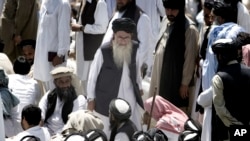Pakistani authorities on Monday released anti-U.S. and pro-Taliban cleric Maulana Sufi Muhammad after eight years in prison. He was facing sedition charges and was allegedly involved in attacks on police stations.
While some in the country do not view Muhammad's release as a good sign, others support the move.
"He is a 93-year-old person. He is seriously sick, almost paralyzed and could not be treated inside the jail," Latif Afridi, a lawyer and an expert of legal affairs, told VOA. "The Pakistani courts have the power to release the sick and people who are so old on bail."
Muhammad is considered one of the many controversial clerics in Pakistan. He gathered around 10,000 armed militants in 2001 in Pakistan's tribal regions to fight against U.S.-led forces in Afghanistan. He also led the pro-Sharia movement in Pakistan's northwestern Khyber Pakhtunkhwa province in the early 1990s and again in the 2000s, which ended with violence and a crackdown on his supporters in different parts of the province.
Afridi argued that while Muhammad has been in prison for a long time, no case could be proven against him in court and, therefore, he was fairly released.
But Peshawar-based human rights activist Mehsood Alam, in an interview with VOA, criticized the decision.
"The release of Sufi Muhammad by Peshawar High Court was a newsworthy development, but in a country where the chief of Jamaat ud Dawa [JUD] could be released and mainstreamed, why Sufi Muhammad could not be released," Alam said.
JUD is a U.N. and U.S.-designated terror group. Its chief, Hafiz Saeed, the alleged mastermind of 2008 Mumbai attacks, was released by Pakistani authorities on court orders last year.
Maulana Sufi Muhammad is the father-in-law of Pakistan's most wanted Taliban leader Mullah Fazlullah. Pakistan accuses Mullah Fazlullah of masterminding terrorist activities inside Pakistan from across the border in Afghanistan. Mullah Fazlullah's group Tehrik-e-Taliban Pakistan (TTP) has accepted responsibility for scores of terrorist attacks in Pakistan, including the killing of Pakistani major general Sanaullah Niazi.
It is not yet known whether the aged cleric has influence on his militant son-in-law Mullah Fazlullah.
Pakistani media reports say that Maulana Sufi Muhammad has been moved to an unknown location after his release.
Rising tensions
The development comes amid rising U.S.-Pakistani tensions following President Donald Trump's accusations that Pakistan was harboring militants and is withholding American aid to Islamabad.
Washington accuses Pakistan of turning a blind eye to militants. Pakistan denies the charge. In his first tweet of 2018, Trump said that the United States had "foolishly" given Pakistan more than $33 billion in aid in the last 15 years and had gotten nothing in return but "lies & deceit."
Aizaz Ahmad Chaudhry, Pakistan's ambassador to Washington, accused the Trump administration of ignoring the sacrifices made by Pakistan in the war on terror.
The claim is unfair, Chaudhry told The Associated Press.
"We have been the victim of terrorist attacks and how can we tolerate the presence of militants on our soil," he said.
Ties between Islamabad and Washington could be further strained by the release of Muhammad, who in 2001 issued an edict, or fatwa, for holy war against U.S.-led forces in Afghanistan.
Some information for this report was provided by The Associated Press.




